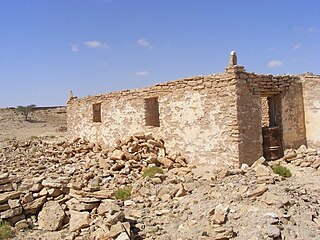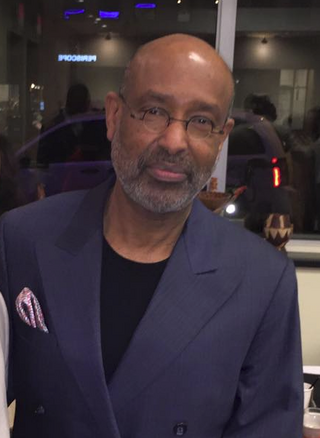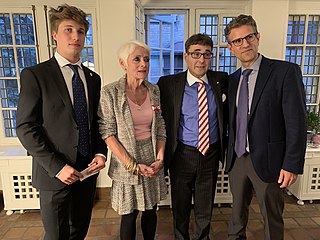Related Research Articles

The Somali people are a Cushitic ethnic group native to the Horn of Africa who share a common ancestry, culture and history. The East Cushitic Somali language is the shared mother tongue of ethnic Somalis, which is part of the Cushitic branch of the Afroasiatic language family, and they are predominantly Sunni Muslim. Forming one of the largest ethnic groups on the continent, they cover one of the most expansive landmasses by a single ethnic group in Africa.
Global citizenship is a form of transnationality, specifically the idea that one's identity transcends geography or political borders and that responsibilities or rights are derived from membership in a broader global class of "humanity". This does not mean that such a person denounces or waives their nationality or other, more local identities, but that such identities are given "second place" to their membership in a global community. Extended, the idea leads to questions about the state of global society in the age of globalization.
Abdi Mohamed Kusow is a Somali scholar and writer.

Harti, meaning "strong man", is a Somali clan confederation, part of the larger Darod clan. The major sub-clans include the Majeerteen, Warsangeli, Dishiishe and Dhulbahante while the minor sub-clans consist of Kaskiqabe, Geesaguule and Liibaangashe.
Madeleine Arnot, née MacDonald is a Professor of Sociology of Education at the University of Cambridge, Faculty of Education. She is Director of Studies (Education) at Jesus College. Internationally known for her work on socio-cultural reproduction theory and her use of Basil Bernstein's theory of pedagogy in relation to gender and education.
Science, technology, society and environment (STSE) education, originates from the science technology and society (STS) movement in science education. This is an outlook on science education that emphasizes the teaching of scientific and technological developments in their cultural, economic, social and political contexts. In this view of science education, students are encouraged to engage in issues pertaining to the impact of science on everyday life and make responsible decisions about how to address such issues
Joe Lyons Kincheloe was a professor and Canada Research Chair at the Faculty of Education, McGill University in Montreal and founder of The Paulo and Nita Freire International Project for Critical Pedagogy. He wrote more than 45 books, numerous book chapters, and hundreds of journal articles on issues including critical pedagogy, educational research, urban studies, cognition, curriculum, and cultural studies. Kincheloe received three graduate degrees from the University of Tennessee. The father of four children, he worked closely for the last 19 years of his life with his partner, Shirley R. Steinberg.
The ecopedagogy movement is an outgrowth of the theory and practice of critical pedagogy, a body of educational praxis influenced by the philosopher and educator Paulo Freire. Ecopedagogy's mission is to develop a robust appreciation for the collective potentials of humanity and to foster social justice throughout the world. It does so as part of a future-oriented, ecological and political vision that radically opposes the globalization of ideologies such as neoliberalism and imperialism, while also attempting to foment forms of critical ecoliteracy. Recently, there have been attempts to integrate critical eco-pedagogy, as defined by Greg Misiaszek with Modern Stoic philosophy to create Stoic eco-pedagogy.
Multicultural education is a set of educational strategies developed to provide students with knowledge about the histories, cultures, and contributions of diverse groups. It draws on insights from multiple fields, including ethnic studies and women studies, and reinterprets content from related academic disciplines. It is a way of teaching that promotes the principles of inclusion, diversity, democracy, skill acquisition, inquiry, critical thought, multiple perspectives, and self-reflection. One study found these strategies to be effective in promoting educational achievements among immigrant students.
Afrocentric education refers to a pedagogical approach to education designed to empower people of the African diaspora with educational modes in contact and in line with the cultural assumptions common in their communities. A central premise behind it is that many Africans have been subjugated by having their awareness of themselves limited and by being indoctrinated with ideas that work against them and their cultures.

Somali studies is the scholarly term for research concerning Somalis and Greater Somalia. It consists of several disciplines such as anthropology, sociology, linguistics, historiography and archaeology. The field draws from old Somali chronicles, records and oral literature, in addition to written accounts and traditions about Somalis from explorers and geographers in the Horn of Africa and the Middle East. The Somali Studies International Association is the primary organization for Somalist scholars. Bildhaan, Somali Studies, Horn of Africa and the Anglo-Somali Society Journal likewise serve as the field's main periodicals. Since 1980, prominent Somalist scholars from around the world have also gathered annually to hold the International Congress of Somali Studies.
Carlos Alberto Torres Novoa is a distinguished professor.

Ahmed Ismail Samatar is a Somali writer, professor and former dean of the Institute for Global Citizenship at Macalester College. He is the editor of Bildhaan: An International Journal of Somali Studies, and brother of Abdi Ismail Samatar, chair of the geography department at the University of Minnesota. Samatar joined the Peace, Unity, and Development Party, the ruling party of the self-declared Republic of Somaliland in June 2016. Samatar is being widely touted as a possible candidate for Somaliland's 2022 presidential elections.
Global citizenship education (GCED) is a form of civic learning that involves students' active participation in projects that address global issues of a social, political, economic, or environmental nature. The two main elements of GCE are 'global consciousness'; the moral or ethical aspect of global issues, and 'global competencies', or skills meant to enable learners to participate in changing and developing the world. The promotion of GCE was a response by governments and NGOs to the emergence of supranational institution, regional economic blocs, and the development of information and communications technologies. These have all resulted in the emergence of a more globally oriented and collaborative approach to education. GCE addresses themes such as peace and human rights, intercultural understanding, citizenship education, respect for diversity and tolerance, and inclusiveness.

Ratna Ghosh is a Canadian academic and education scholar. She is a Distinguished James McGill Professor and Sir William C. Macdonald Professor of Education at McGill University in Montreal, Canada, where she previously served as the Dean of the Faculty of Education from 1998 – 2003.

Naomi Kramer is a Canadian curator and president of the Holocaust Education and Genocide Prevention Foundation.
Mejai Bola Mike Avoseh is a professor of adult and higher education at the University of South Dakota. His teaching and research interests are in the areas of adult education, comparative/international/multi-cultural education and indigenous pedagogy. He is a member of the board of the American Association for Adult and Continuing Education (AAACE) since 2016, and of the International Society for Comparative Adult Education (ISCAE) from 2020 to 2023, and the Director of the Commission for International Adult Education (CIAE) of AAACE.

Liz Jackson is an American scholar of the philosophy of education and educational theory. She is currently a Professor and Head of the Department of International Education in the Faculty of Education and Human Development at the Education University of Hong Kong. Previously she was associate professor at the University of Hong Kong, where she also served as the Director of the Master of Education Program and the Director of the Comparative Education Research Centre (CERC). She is also a Fellow and Past President (2018-2020) of the Philosophy of Education Society of Australasia (PESA).
References
- ↑ Ali Abdi - Faculty of Education Archived January 12, 2011, at the Wayback Machine
- ↑ "Journal of Contemporary Issues in Education". ejournals.library.ualberta.ca. Retrieved 2017-10-25.
- ↑ "David Lam Chair in Multicultural Education". Archived from the original on 2012-07-11. Retrieved 2009-11-27.
- 1 2 3 4 5 "Ali A. Abdi". Black In Canada. Retrieved 2017-10-25.